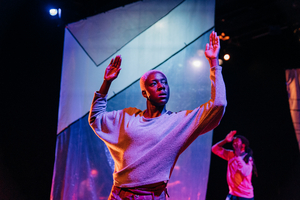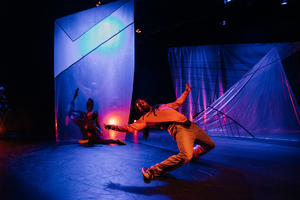Review: PAPILLON at La Chapelle Scènes Contemporaines
Helen Simard's chaos meditation walks its own walk, opens to no audience.

When I was approached to review Papillon, by celebrated Montreal choreographer Helen Simard, whose REQUIEM POP I had enjoyed so much, I asked for a ticket to the November 2nd show. Montreal, where I live, was in a red zone, which means we were back in lockdown. These restrictions were due to be lifted on October 26th.
Could I also get a livestream ticket? I asked, eyeing my local COVID-19 case tracker. You know... in case anything happens?
On the 26th, restrictions were pushed back for another 28 days. Papillon ran live from October 29th to November 7th. There was no audience.
Papillon grapples with chaos. Against an experimental and live music soundtrack, three solo performances unfold at once. Simard explains that much of the choreography is improvised, or rooted heavily in improvisation. The dancers have studied how to improvise these movements for months. To be able to speak spontaneously, we must dedicate hours to learning how the language works. Movement, like sound, can be grouped into language: there is a reason that I, with my mute body, cannot put together a series of motions which evokes the kind of story told by Mecdy Jean-Pierre, one of the three dancers in Papillon: Jean-Pierre has been dancing since he was a child. Jean-Pierre started putting together a movement language inspired by traditional Haitian dance with his family. As he grew, so did his body's vocabulary. In Papillon, we witness a native speaker of movement. We see sound enter his body. We see his body translate: at once full-bodied and isolated, his body replies. His body's phrases echo upwards. They spiral down into the ground. They exit, replaced by others. They are sent back to the musicians, the other dancers.

In common language, we use chaos to describe a state of confusion or disorder. Papillon urges us to look closer, at the delicately inter-connected systems which inform disorder. What is a better lesson for this time, than to see chaos and sink into excitement for the opportunity to learn? Simard tells us that Papillon is informed by chaos theory. Chaos theory holds that the great explosion is not a disaster, but systems unfolding as they should. My body, which is not a native speaker of the language of bodies, cannot hear their language unless I sit very still and try very hard. I did not understand at the outset of Papillon. Like a moment of chaos, I had to suspend my judgements. I had to go limp. I still struggle with dance: I am a poet, and often feel like the worst part of a poetry reading is how much poetry is in it. Similarly, I usually find myself wishing that dance shows were shorter. I feel my attention waning in the middle of Papillon. Then I come back to my body. I come back in.
After the live performances were cancelled, when I tuned into the livestream, I had to train my body to receive the way that Nindy Banks's small, phrenetic movements acted with and against the experimental score. Banks's body's language broke into the language of my body: at the swell of a movement of the music provided by Roger White, Remy Saminadin and Ted Yates, I saw it: a direct line connecting with my attention. I felt the gathering of my attention like a long loop of thread. I felt the casting-down of my attention, to watch where she held movement rolling back and forth between her shoulder blades, between her ankles, constant like a snare drum.
The COVID-19 pandemic has brought its obvious violences: dying relatives we can't get to. Economic hardship unseen since the Great Depression. Papillon asks us to look at the patterns here. Who benefits? What informs? Jeff Bezos, the richest man alive, has only seen his income grow since the pandemic locked us all inside. His employees have their bathroom breaks monitored, spread the worst public health crisis of the last century back and forth like a secret or a promise, die of heart attacks on the shipping room floors.
There is also the small, everyday chaos of the year. People talk about living in some kind of Groundhog Day perpetuity, every day exactly like the last. In the last few months, I have seen so many people be so exceptionally cruel to each other. Writer Ashley C. Ford tweets that we are witnessing people go through withdrawal from the emotional addiction to the myth of certainty.
.jpg.jpg)
I feel the addiction to certainty in Papillon, and the addiction is mine. I see it in the way that I am brought onto the stage, before an audience who is not there because the audience is not a guarantee. I see it in the way Victoria Mackenzie invites me into her movement language, which I anticipate as contemporary but meet as urban, or vice versa, because my anticipation is not a guarantee. I see it in how Mackenzie climbs over cresting waves of music which takes left turns where I do not expect them, because music is not a guarantee. I see it when I get a good view of Mackenzie's face, and have the wind knocked out of me by the softness of her expression, a sudden foil to the angular and commanding dialect of her limbs and torso. I feel my body, inert in bed, exhausted from my day of withdrawal, edged forward into a world which must be good enough because it is the one that is here. I am shocked into awe by this team who performed their show for an audience of atoms and light waves and energy, which cannot be destroyed but only changed. I am inched forward into movement, like an electron. Like a butterfly.
Papillon will be re-broadcast at noon November 13th. Tickets can be purchased at this link.
Reader Reviews

Videos
